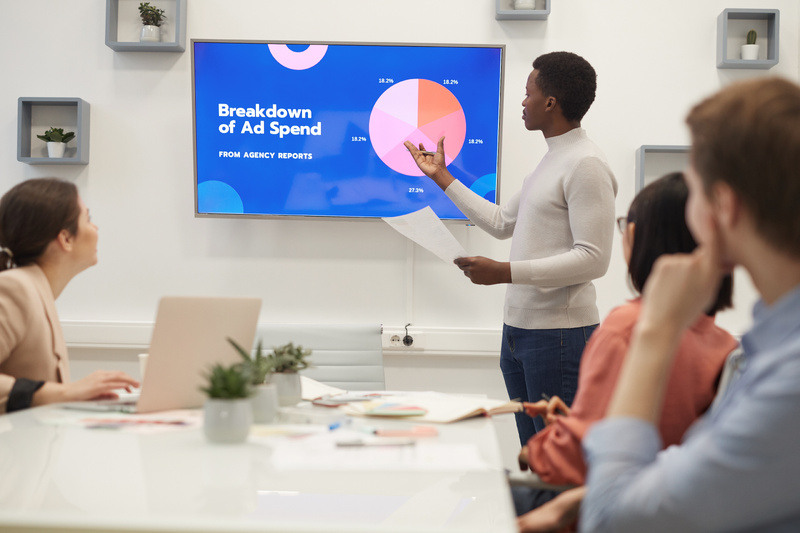Understanding the Relationship Between Website Design & SEO
When it comes to creating a digital presence that truly stands out, many business professionals focus on a website's visual appeal or its ability to...
I know what I am looking for, and would like to chat.
A team of data-driven marketers obsessed with generating revenue for our clients.
Because the proof is in the pudding.
At Campaign Creators we live by three principles: Autonomy, Mastery, Purpose.

Search Engine Optimization (SEO) has always been the foundation of driving organic website traffic. For years, businesses have obsessed over climbing to the top of search engine rankings, believing that traffic alone was the ultimate goal.
But here's the truth: traffic is only part of the equation. What truly matters is what happens after a visitor arrives.
Are they engaging? Are they converting? Are they becoming loyal customers? The difference between a website that attracts visitors and one that drives results lies in conversions, because clicks without action are just numbers.
Enter the era of AI, an innovative force that’s rewriting the rules of SEO. We live in a digital landscape where AI doesn’t just help you rank for keywords and predict what the audience wants. AI systems analyze user behavior in real time, refine content strategies, and deliver hyper-personalized experiences that turn casual visitors into loyal brand advocates.
It may seem like something out of a Sci-Fi movie, but it's happening now. Businesses are leveraging AI-powered SEO to elevate their strategies in ways we couldn’t have imagined a decade ago.
Traditional methods—stuffing keywords, chasing backlinks, creating generic content—are replaced by more innovative, intuitive approaches. With AI, marketers can uncover hidden opportunities in keyword research, crafting content that doesn’t just rank but resonates. It’s like having a crystal ball into the minds of your audience.
This article dives into why SEO is essential for boosting website conversions, explores the challenges of mastering SEO, and discusses how AI-powered SEO tools can optimize every funnel stage. By the end, you’ll walk away with actionable insights on how to use AI for SEO strategies that build stronger lead-generation systems and ultimately boost your bottom line.
A solid SEO strategy does more than rank your website high on search engine results pages (SERPs). It aligns your site with user intent, bringing in high-quality, relevant audiences that are more likely to convert.
This is the power of AI-powered SEO: it bridges the gap between visibility and value. It’s no longer about driving random traffic to your site; it’s about connecting with the right audience and guiding them seamlessly from search to purchase. As AI continues to evolve, so too does the potential for businesses to achieve measurable, sustainable growth online.
Here's the connection between SEO and conversions:
AI tools for SEO go beyond keywords and rankings, harnessing the power of personalization. Picture a visitor landing on your site and being greeted with a custom-tailored experience based on their previous searches and preferences. AI ensures the content they see is exactly what they’re looking for, increasing the likelihood of staying, engaging, and ultimately converting.
However, achieving these results requires mastery of SEO best practices, and with constantly changing algorithms, it’s easier said than done.
Even seasoned marketing professionals and businesses with extensive SEO expertise encounter challenges when sustaining high conversion rates. Despite mastering the art of driving traffic and ranking on search engines, the journey from clicks to conversions often reveals unexpected hurdles.
Here are the top pain points marketers encounter:
This is where AI-powered SEO tools come into play, simplifying complex tasks and accelerating marketing success.
Marketers must adopt data-driven tactics to stay competitive and ensure website conversions while preparing for the evolving search landscape. Key practices include:
Search engines increasingly prioritize delivering the right answer to the right person at the right time. Focus not only on keywords but also on context. AI search engine optimization enables tools to analyze search intent and generate content guidelines addressing user needs.
With generative AI tools like Google’s “AI Overviews” gaining prominence, SEO must adapt. Informational pages need enhanced optimization, including rich snippets and schema markup, to remain relevant in zero-click searches.
Core Web Vitals metrics (loading time, interactivity, and visual stability) directly impact ranking and user satisfaction. Use AI tools such as Screaming Frog for diagnostics and real-time performance tracking.
Visual content optimization (e.g., alt text, structured data) and location-specific SEO strategies attract niche audiences who are more likely to convert.
Emerging practices centered on user intent and technical performance are vital for boosting conversions, but AI offers even more robust opportunities to unlock the full potential of your SEO efforts.
AI has proven pivotal in taking SEO beyond traditional keyword strategies to deliver actionable, conversion-driving insights. Here are four key contributions of AI for SEO optimization:
AI tools like SemRush and Jasper put context at the forefront of keyword research. They analyze millions of data points to uncover the most competitive and conversion-focused keywords within searchable niches. Additionally, AI identifies long-tail keywords with high purchase intent, making campaigns more targeted.
AI writing assistants, like ChatGPT or Jasper, go beyond creating SEO-friendly content by dynamically rewriting sentences to improve readability, tone, and keyword usage. They also provide real-time suggestions for structure and formatting that resonate with readers while satisfying algorithms.
AI analyzes browsing behaviors and historical data to adapt landing pages dynamically for each user. Personalized calls-to-action (CTAs), tailored suggestions, and custom visual elements foster engagement and retention.
AI tools like Ahrefs and SurferSEO continuously monitor your web pages, offering valuable insights into rankings, competitor strategies, and user behavior trends. AI speeds up data consolidation, helping digital marketing managers make more intelligent adjustments.
By layering these AI-powered capabilities onto your existing SEO tactics, marketers can achieve higher engagement rates, lower bounce rates, and, most importantly, increased conversions.
Integrating AI into your SEO approach isn’t just about replacing manual processes; it’s about elevating strategy and efficiency. Here's how to use AI for SEO optimization:
Start small, testing techniques that bring immediate improvements, and scale gradually to build an AI-enhanced toolkit tailored to your goals.
The integration of AI into SEO is far from over. Here’s what the continued synergy of AI and SEO may look like:
Staying ahead means partnering with cutting-edge tools and practices while emphasizing ethical, user-first SEO strategies.
AI is revolutionizing SEO, tackling old challenges and opening up exciting new opportunities to boost website conversions. By combining AI-powered insights with tried-and-true optimization strategies, businesses can build smarter, more effective SEO frameworks that drive results and scale effortlessly. The future of SEO starts here!
Are you ready to shape the future of SEO performance for your business? We’re here to help. Explore how our solutions can implement AI-powered SEO strategies to drive measurable growth. Contact us today to harness the power of AI for SEO optimization and boost your conversions.

When it comes to creating a digital presence that truly stands out, many business professionals focus on a website's visual appeal or its ability to...

Picture this: you’re standing at a crossroads, trying to decide the best path to take in your marketing journey.

What Is Local SEO? Local SEO helps provide users with relevant search engine results based on their current location. We’ve all seen and used this...